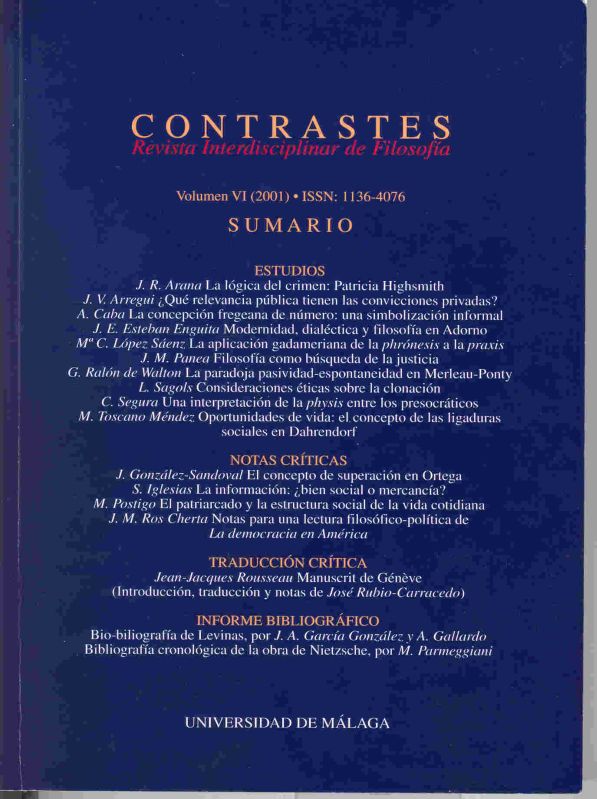La aplicación gadameriana de la phrónesis a la praxis
DOI:
https://doi.org/10.24310/Contrastescontrastes.v0i0.1624Keywords:
HERMENÉUTICA, GADAMER, RACIONALIDAD, HABERMASAbstract
RESUMEN
La autora de este artículo estudia la interpretación gadameriana de la phrónesis aristotélica como un paradigma de la comprensión-aplicación hermenéutica. Con Gadamer, subraya la actualidad de este saber práctico, una vez reconducido a su sentido originario. Finalmente, plantea algunas conclusiones críticas que arrancan de la confrontación con otras alternativas de racionalidad crítica, principalmente de la habermasiana.
PALABRAS CLAVE
HERMENÉUTICA-GADAMER-RACIONALIDAD-HABERMAS
ABSTRACT
The aim of this paper is to study Gadamer´s interpretation of the Aristotelian idea of phronesis as a paradigm for hermeneutical comprenhension-application. In line with Gadamer´s thought, it underlines the actuality of this practical knowledge, once its original meaning has been recognized. Finally, it confronts hermeneutics with other forms of rationality, mainly Habermasian rationality.
KEYWORDS
HERMENEUTICS-GADAMER-RATIONALITY-HABERMAS
Downloads
Metrics
Publication Facts
Reviewer profiles N/A
Author statements
Indexed in
-
—
- Academic society
- N/A
- Publisher
- Universidad de Málaga
Downloads
Published
How to Cite
Issue
Section
License
This journal provides immediate free access to its content under the principle of making research freely available to the public. All content published in Contrastes. Revista Internacional de Filosofía, are subject to the Creative Commons Attribution-NonCommercial-ShareAlike 4.0 license whose full text can be found at <http://creativecommons.org/licenses/by-nc-sa/4.0>
It is the responsibility of the authors to obtain the necessary permissions of the images that are subject to copyright.
Authors whose contributions are accepted for publication in this journal will retain the non-exclusive right to use their contributions for academic, research and educational purposes, including self-archiving or repository in open access repositories of any kind.
The electronic edition of this magazine is edited by the Editorial Service of the University of Malaga (Uma Editorial), being necessary to cite the origin in any partial or total reproduction.










5.png)
